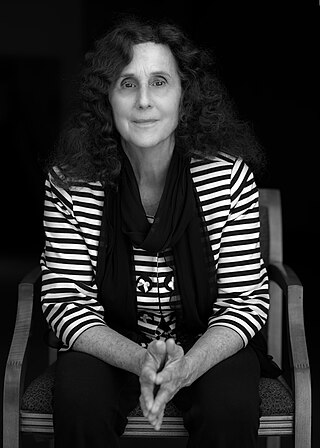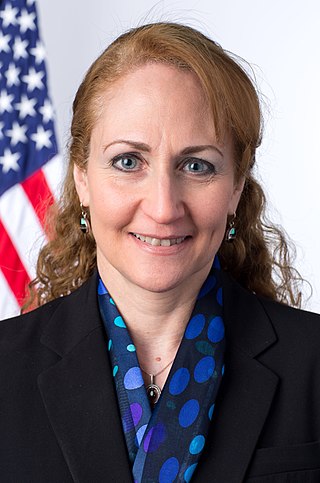Related Research Articles

Pamela Jane Bjorkman NAS, AAAS is an American biochemist and molecular biologist. She is the David Baltimore Professor of Biology and Biological Engineering at the California Institute of Technology (Caltech). Her research centers on the study of the three-dimensional structures of proteins related to Class I MHC, or Major Histocompatibility Complex, proteins of the immune system, and proteins involved in the immune responses to viruses. Bjorkman's goal is to improve current therapeutic applications. Bjorkman is most well known as a pioneer in the field of structural biology.

Cornelia Isabella "Cori" Bargmann is an American neurobiologist. She is known for her work on the genetic and neural circuit mechanisms of behavior using C. elegans, particularly the mechanisms of olfaction in the worm. She has been elected to the National Academy of Sciences and had been a Howard Hughes Medical Institute investigator at UCSF and then Rockefeller University from 1995 to 2016. She was the Head of Science at the Chan Zuckerberg Initiative from 2016 to 2022. In 2012 she was awarded the $1 million Kavli Prize, and in 2013 the $3 million Breakthrough Prize in Life Sciences.
Julie A. Theriot is a cell biologist, who studies the molecular mechanics and dynamics of cell movement and organization. Her work spans many fields from microbiology to biophysics, and lab studies eukaryotic cell motility as well as the hijacking of the cytoskeleton by intracellular parasites like listeria. She has also published work that describes the mechanisms of Galvanotaxis in vertebrate cells. She is a professor at the University of Washington, Department of Biology, a continuing Howard Hughes Medical Institute (HHMI) Investigator, and Chief Scientist at the Allen Institute for Cell Science. She was previously a professor at the Stanford University School of Medicine, and before that, she was a Predoctoral Fellow and Investigator at HHMI. She was also a fellow at the Whitehead Institute for Biomedical Research.

Jo Emily Handelsman is the Director of the Wisconsin Institute for Discovery at University of Wisconsin–Madison. She is also a Vilas Research Professor and a Howard Hughes Medical Institute Professor. Handelsman was appointed by President Barack Obama as the Associate Director for Science at the White House Office of Science and Technology Policy, where she served for three years until January 2017. She has been editor-in-chief of the academic journal DNA and Cell Biology and author of books on scientific education, most notably Scientific Teaching.

Erin K. O'Shea is an American biologist who is president of the Howard Hughes Medical Institute (HHMI). In 2013, she was named HHMI's vice president and chief scientific officer. Prior to that, she was a professor of molecular and cellular biology and chemistry and chemical biology at Harvard University. In 2016, her appointment as future, and first woman, president of HHMI was announced. She has been a Howard Hughes Medical Institute (HHMI) investigator since 2000.

The contributions of women in climate change have received increasing attention in the early 21st century. Feedback from women and the issues faced by women have been described as "imperative" by the United Nations and "critical" by the Population Reference Bureau. A report by the World Health Organization concluded that incorporating gender-based analysis would "provide more effective climate change mitigation and adaptation."
Dianne Newman is a molecular microbiologist, a professor in the Division of Biology and Biological Engineering and the Division of Geological and Planetary Sciences at California Institute of Technology. Her research interests include bioenergetics and cell biology of metabolically diverse, genetically-tractable bacteria. Her work deals with electron-transfer reactions that are part of the metabolism of microorganisms.
Catherine (Cathy) Drennan is an American biochemist and crystallographer. She is the John and Dorothy Wilson Professor of Biochemistry professor at the Massachusetts Institute of Technology and a professor at the Howard Hughes Medical Institute.

Jessica Hellmann is a Professor of Ecology and the director of the Institute on the Environment at the University of Minnesota. She is recognized as "one of the nation’s leading researchers on global change ecology and climate adaptation". Hellmann was one of the first to identify that living with climate change is "just as crucial to the future of humanity and Earth’s ecosystems as slowing and stopping greenhouse gas emissions". Her lab uses mathematical models, genomic techniques to identify the impact of climate change on ecology and evolution. Jessica Hellmann also has a spouse, Larry LaTarte (1974) and one daughter, Ada LaTarte (2007).
Erin Margaret Schuman, born May 15, 1963, in California, US, is a neurobiologist who studies neuronal synapses. She is currently a Director at the Max Planck Institute for Brain Research.
Elizabeth S. Sattely is an American scientist and biotechnology engineer. She is an Associate Professor of Chemical Engineering in the Department of Chemical Engineering, an HHMI investigator, and a ChEM-H Faculty Fellow at Stanford University.
Jelena Vučković is a Serbian-born American professor and a courtesy faculty member in the Department of Applied Physics at Stanford University. She served as Fortinet Founders Chair of the Department of Electrical Engineering at Stanford University from August 2021 through June 2023. Vučković leads the Nanoscale and Quantum Photonics (NQP) Lab, and is a faculty member of the Ginzton Lab, PULSE Institute, SIMES Institute, and Bio-X at Stanford. She was the inaugural director of the Q-FARM initiative. She is a Member of the National Academy of Sciences, and a Fellow of The Optical Society, the American Physical Society and the Institute of Electrical and Electronics Engineers.
Elisabeth Holland is an American climate scientist who focuses on how the carbon and nitrogen cycles interact with earth systems. She has become a key player in the international climate debate. She is currently a professor of climate change at the University of the South Pacific. She is also the director of the Pacific Center for Environmental and Sustainable Development.
Elena M. Bennett is an American ecosystem ecologist specializing in studying the interactions of ecosystem services on landscape. She is currently a Professor and the Canada Research Chair in Sustainability Science at McGill University. She was inducted to the Royal Society of Canada’s College of New Scholars, Artists, and Scientists in 2017. She was elected a member of the National Academy of Sciences in 2022 and became a Guggenheim Fellow in the same year.
Polly Fordyce is an Associate Professor of Genetics and Bioengineering and fellow of the ChEM-H Institute at Stanford University. Her laboratory's research focuses on developing and applying new microfluidic platforms for quantitative, high-throughput biophysics and biochemistry and single-cell genomics.
Julie Baker is an American biologist who studies genetics and genomics, cell fate determination, and cellular communication. She is a professor of Genetics at the Stanford University School of Medicine and is a member of Stanford Bio-X and the Stanford Maternal & Child Health Research Institute (MCHRI).

Denise Johnson Montell is an American biologist who is the Duggan Professor of Molecular, Cellular, and Developmental Biology at the University of California, Santa Barbara. Her research considers the oogenesis process in Drosophila and border cell migration. She has served as president of the Genetics Society of America and was elected to the National Academy of Sciences in 2021.
Sara Elaine Brownell is an American biology education researcher who is a President's Professor at Arizona State University. Her research looks to make undergraduate science teaching more inclusive. She was elected a Fellow of the American Association for the Advancement of Science in 2022.
Chantell Skye Evans is an American cell biologist who is a professor at Duke University. Her research looks to understand the dynamical processes of mitochondria and their role in neurodegenerative disease. In 2022, Popular Science named her as one of their "Brilliant 10" U.S. scientists and engineers.
Moisés Expósito-Alonso is a Spanish scientist and assistant professor of global change biology at the University of California, Berkeley, member of the Innovative Genomics Institute, and inaugural Freeman Hrabowski Scholar from the Howard Hughes Medical Institute. His research includes the study of plants and how climate change affects their evolution.
References
- 1 2 3 4 5 6 7 University, Stanford (2017-12-06). "An 'accidental professor' leads Stanford's Faculty Senate". Stanford News. Retrieved 2024-05-02.
- 1 2 3 "Elizabeth Hadly". iBiology. Retrieved 16 September 2020.
- ↑ "Elizabeth A Hadly | Hadly Lab". hadlylab.stanford.edu. Retrieved 2024-02-07.
- ↑ "Elizabeth Hadly: Current Research and Scholarly Interests". Stanford University. Retrieved 16 September 2020.
- ↑ Hannibal, Mary Ellen. "Stanford Paleoecologist Elizabeth Hadly Takes on the Future -". Bay Nature. Retrieved 2024-05-02.
- ↑ "Q&A: Elizabeth Hadly, new senior Vice Provost for Undergraduate Education". 2013-04-25. Retrieved 2024-05-02.
- 1 2 "Elizabeth Hadly". LinkedIn. Retrieved 1 May 2024.[ unreliable source? ]
- ↑ "Anthropocene Research | Hadly Lab". hadlylab.stanford.edu. Retrieved 2024-05-02.
- 1 2 3 "Elizabeth A Hadly | Hadly Lab". hadlylab.stanford.edu. Retrieved 2024-05-02.
- 1 2 "Elizabeth Hadly, PhD: HHMI Professor / 2018—Present". Howard Hughes Medical Institute. Retrieved 16 September 2020.
- ↑ University, © Stanford; Stanford; California 94305 (2017-12-14). "Stanford professors will use a $1 million grant to change the way undergraduate scientists learn". Stanford Graduate School of Education. Retrieved 2024-05-02.
{{cite web}}: CS1 maint: numeric names: authors list (link) - ↑ "Elizabeth Hadly's research while affiliated with Stanford University and other places". ResearchGate. Retrieved 16 September 2020.
- ↑ "Hadly EA[Author] - Search Results - PubMed". PubMed. Retrieved 2024-05-02.
- ↑ Barnosky, Anthony D.; Hadly, Elizabeth A.; Bascompte, Jordi; Berlow, Eric L.; Brown, James H.; Fortelius, Mikael; Getz, Wayne M.; Harte, John; Hastings, Alan; Marquet, Pablo A.; Martinez, Neo D.; Mooers, Arne; Roopnarine, Peter; Vermeij, Geerat; Williams, John W.; Gillespie, Rosemary; Kitzes, Justin; Marshall, Charles; Matzke, Nicholas; Mindell, David P.; Revilla, Eloy; Smith, Adam B. (2012). "Approaching a state shift in Earth's biosphere". Nature. 486 (7401): 52–58. Bibcode:2012Natur.486...52B. doi:10.1038/nature11018. hdl: 10261/55208 . ISSN 0028-0836. PMID 22678279. S2CID 4788164.
- ↑ Hannibal, Mary Ellen (2016-06-17). "'Tipping Point for Planet Earth,' by Barnosky and Hadly". SFGate. Retrieved 2020-09-18.
- ↑ Rechtshaffen, Michael. "French eco-doc 'Tomorrow' calls for action today". courant.com. Retrieved 2020-09-18.
- ↑ "About Us | Stanford Woods Institute for the Environment". woods.stanford.edu. Retrieved 2024-05-02.